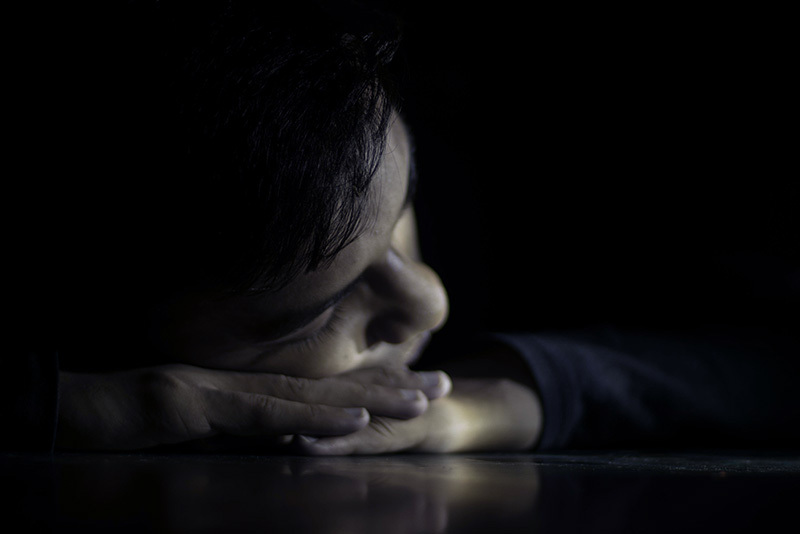Summertime Sadness: Helping children manage summer depression

Summer’s here, which means school is out and the sun is in. It’s everyone’s favorite season. Unless it’s not.
Summer can bring with it feelings of depression or anxiety, which can be especially frustrating for young people who may think they’re supposed to unequivocally love this time of year.
We spoke with Dr. Deepika Shaligram, a psychiatrist at Boston Children’s Hospital, to help unpack summer depression (or reverse seasonal affective disorder) and how families can help manage it.
Can depression really be triggered by summer?
“Absolutely,” Dr. Shaligram says. “Summer depression is very real.”
Summer depression is a lesser-known form of seasonal affective disorder (also called SAD). SAD is a form of recurrent major depressive disorder that has a seasonal onset and resolution, meaning it occurs at the same time every year. Although we don’t know exactly what causes SAD, researchers believe that it’s associated with changes in daylight that cause shifts in our biological clock and circadian rhythm, which control the natural, internal processes that regulate our sleep, mood, and hormones.
SAD is most often linked to the winter months and the loss of daylight, but for some, symptoms begin in the late spring or early summer, even as daylight hours increase.
How is summer SAD different than winter SAD?
Symptoms of winter depression commonly include increased sleep and appetite, weight gain, and low mood. Summer depression, however, typically presents with trouble sleeping, decreased appetite and weight loss, feelings of helplessness, worthlessness, and a lack of motivation and interest in activities.
“With winter depression, the major factor is the brevity of daylight hours,” says Dr. Shaligram. “But when we have very long, bright days, this can affect our sleep cycles, and when it’s very hot, that limits our ability to do things that boost our mood, like being outside and getting exercise.”
There is also research to suggest a significant role in environmental factors that can cause a physiological depressive response; these include increases in air pollution and pollen as well as airborne infectious agents. In addition, climate change is thought to be having a negative impact on children’s mental well-being, both directly (through heat-and-humidity-related difficulties such as asthma) and more indirectly through depression and posttraumatic stress disorder, which can be associated with natural disasters such as hurricanes.
Can summer depression be caused by something other than biology?
“There are many factors that can contribute to feeling depressed during the summer, but children may be more susceptible for a few reasons,” Dr. Shaligram says. These include:
Lack of structure and support
For many kids, summer is a break from academic pressures, busy schedules, and bullying from classmates. But it can also be the loss of much-needed routine and support, which provide children with a sense of security and help them develop self-discipline and healthy habits.
And there are distinct cohorts of young people who may find time away from the support of their school especially challenging:
“As we saw amplified with the COVID-19 pandemic, children who face housing or food insecurity, social isolation, or domestic abuse suffer the most when they lose access to the resources and relief their school provides,” Dr.Shaligram says. “Sometimes a child’s only connection to a caring adult may be an interested teacher.”
In addition, some schools and districts provide children and young adults who are gay, bisexual, transexual, or identify as gender nonconforming with their greatest support systems: a place where they have commonality with others their age, they’re addressed by their preferred name or pronouns, and they can participate in LGBTQ+ alliances and other organizations.
Prescription pauses
On top of shaking up a young person’s social framework, summer vacation can also present a change in their medical regimen. Because certain ADHD medications young people rely on during the school year can be appetite suppressants, providers sometimes suggest pausing these medications over summer break to help children regain their appetite and catch up nutritionally. This disruption, however, can pose consequences as they may have antidepressant benefits.
“The same medications used to treat anxiety are also prescribed for depressive disorders in children,” says Dr. Shaligram. “So, in attempting to trial being off meds for kids who are being treated for anxiety, we may be inadvertently unmasking depressive episodes in kids with a vulnerability for summer depression.”
Dr. Shaligram also notes that the repercussions of stopping medication for children with ADHD might mean that their impulsivity may impact their ability to get along with peers or siblings or make friends at camp and other summer activities. This is why Dr. Shaligram stresses weaning children off medication carefully and under supervision from their provider. She also suggests getting additional support from a therapist who can pick up on any troubling symptoms or behaviors that may arise as medication is tapered and stopped and can pre-emptively offer coping strategies.
How can families manage summer depression?
The most important thing families can do to help their collective mental well-being is pay attention to self-care and routine, says Dr. Shaligram. Here are some of her suggestions to help do so:
Maintain regular sleep and wake times
Dr. Shaligram stresses the importance of keeping to your child’s usual bedtime and wake time to maintain routines that are key to circadian rhythms, which keep the body regulated. But because it’s harder to fall asleep and stay asleep when a room is too bright, Dr. Shaligram suggests blackout curtains to combat the earlier sunrises and later sunsets that leave kids’ rooms brighter for longer in the summer.
Minimize screen time — especially before bed
Because blue light from televisions, phones, and other screens suppresses melatonin levels and delays sleep onset, Dr. Shaligram recommends screen-free activities like journaling and meditation as ways to wind down at the end of the day instead. For children who have depression, these activities can help them process their experiences from the day and keep them from overthinking at bedtime, and the benefits extend beyond sleep:
“Journaling is a wonderful way to get your worries down on paper and empty your brain,” she says. For younger children, she suggests a gratitude journal to record anything they have been thankful for or enjoyed that day. Family gratitude journals are also a great way for families to share their hopes, joys, and goals.
As for meditation, Dr. Shaligram suggests it as a way to regulate breathing and send calming messages to the body. She recommends pairing meditation with daily exercise, which she says can mean 20 minutes of any preferred activity that increases heart rates: dancing, walking, biking, etc.
Spend time together
Finding activities, projects, or hobbies is a great way for families to spend time together over the summer. Even small, brief shared projects or activities are beneficial, Dr. Shaligram says: movie nights, weekend walks, planting something and watching it grow, or volunteering.
What else should parents know about summer depression?
“It’s important to know that SAD is just as significant as any other form of depression and needs attention, even if it’s just seasonal,” Dr. Shaligram says.
“Young people should stop feeling pressure to be happy just because it’s summer vacation. The symptoms of SAD may be subtle, so pay attention to your mood, and do what you need to do to care of yourself.”
Learn more about how the Department of Psychiatry and Behavioral Sciences at Boston Children’s Hospital helps children and young adults navigate behavioral disorders, emotional concerns, and psychiatric diseases.
Related Posts :
-

Behavioral health: What parents should know
Even before a worldwide pandemic uprooted life as we knew it, our children have been grappling with an unprecedented health ...
-

Climate and children’s health: A conversation with Dr. Aaron Bernstein
When Boston Children’s Hospital pediatrician Dr. Aaron Bernstein was in medical school, he was told that climate change — an ...
-

Answers to six questions about anxiety in children and teens
Between school and social demands, lots of children feel stress, but at what point does anxiety cross the line and ...
-

Empowering pediatricians to provide mental health care
By late adolescence, up to 20 percent of children will have experienced impairing levels of anxiety, depression, and/or ADHD, the ...





